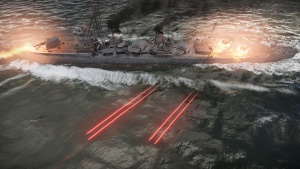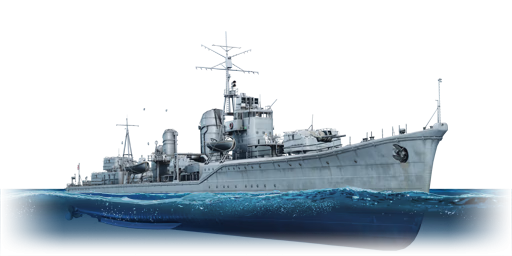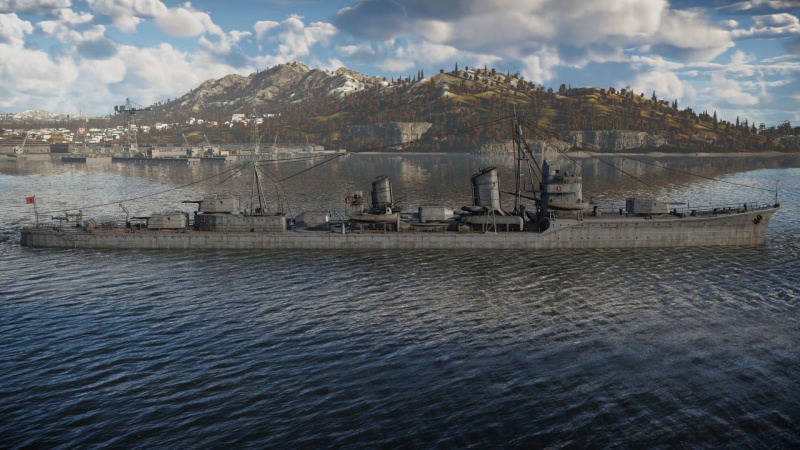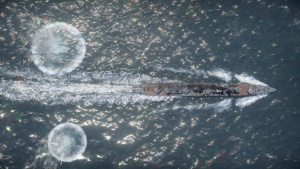IJN Hayanami
Contents
Description
Hayanami (早波, namesake: Fast Waves) was a Yūgumo-class destroyer launched in July 1943, initially assigned to the First Fleet for training. In August 1943, she became part of Destroyer Division 32 and continued training. From October 1943, Hayanami participated in several troop transport operations to Truk and Ponape, and in November 1943, she escorted Admiral Kurita's heavy cruiser group to Rabaul to support the Battle of Bougainville Island. Throughout late 1943 and early 1944, she was involved in various escort and patrol duties across the Pacific, often facing enemy air and submarine attacks. In June 1944, while conducting anti-submarine patrols near Tawitawi during preparations for Operation A-Gō, she was torpedoed by USS Harder and sank rapidly, resulting in a loss of 200 sailors, officers and both commanders onboard. She was officially removed from the Navy List in August 1944.
The Yugumo-class, IJN Hayanami, 1943 is a premium II Japanese destroyer. It was introduced during Update "Winged Lions" as a reward for the 2021 Operation W.I.N.T.E.R. event. It is nearly identical to its sister ship IJN Yugumo, with the biggest differences being an improved anti-air/anti-coastal armament and additional rewards stemming from it being a premium ship. It is a very mobile destroyer with a low profile and outstanding Long Lance torpedoes, but it suffers from low survivability and a lack of AP/SAP shells, making it challenging to deal with enemy destroyers in one-on-one duels.
General info
Survivability and armour
Just like its sister-ship Yugumo, Hayanami upgrades over IJN Ayanami in survivability, primarily due to its lower profile, but also higher crew count. Notably, the Yugumo-class has a much lower freeboard, lower forecastle, and much smaller smoke funnels. This in effect gives it a better chance of avoiding enemy fire, especially at the long range, even though overall it is a longer ship. Additionally, its survivability is further aided by having ammunition stored deep underneath the water line, and having torpedo turrets protected against fragmentation damage, though they are still one of the easiest components to damage on the ship.
Mobility
Hayanami comes spaded as a premium and has a max speed of 79 km/h. Overall its relatively comparable with equivalents in other nations, if not slightly slower, though the differences are within 5% range between most of the destroyers in the same BR. The maximum reverse speed is -31 km/h spaded.
| Mobility Characteristics | |||
|---|---|---|---|
| Game Mode | Upgrade Status | Maximum Speed (km/h) | |
| Forward | Reverse | ||
| AB | |||
| Upgraded | 79 | 31 | |
| RB/SB | |||
| Upgraded | 65 | 25 | |
Modifications and economy
Armament
Primary armament

Like all regular Japanese destroyers, the Hayanami has 3 turrets boasting dual Type 3 127 mm cannons, offering the same capabilities and the same shell choice as the IJN Yugumo. Though as Hayanami sees the same risks in BR, her captain will have to rely on very accurate gunnery and torpedo laying abilities to keep the ship afloat.
| Penetration statistics | |||||||
|---|---|---|---|---|---|---|---|
| Ammunition | Type of warhead |
Penetration @ 0° Angle of Attack (mm) | |||||
| 1,000 m | 2,500 m | 5,000 m | 7,500 m | 10,000 m | 15,000 m | ||
| Type 1 HE | HE | 28 | 28 | 28 | 28 | 28 | 28 |
| HE-TF | HE-TF | 26 | 26 | 26 | 26 | 26 | 26 |
| Shell details | ||||||||||||
|---|---|---|---|---|---|---|---|---|---|---|---|---|
| Ammunition | Type of warhead |
Velocity (m/s) |
Projectile mass (kg) |
Fuse delay (m) |
Fuse sensitivity (mm) |
Explosive mass (TNT equivalent) (kg) |
Ricochet | |||||
| 0% | 50% | 100% | ||||||||||
| Type 1 HE | HE | 910 | 23 | 0 | 0.1 | 2.31 | 79° | 80° | 81° | |||
| HE-TF | HE-TF | 910 | 23 | 0 | 0.1 | 2.07 | 79° | 80° | 81° | |||
Secondary armament
The Hayanami is equipped with three twin mountings of the 25 mm Type 96 autocannon, 1 more than her sister Yugumo. Its setup clearly plays a primary role as an anti-aircraft weaponry, having turrets located to provide optimal AA coverage, however they are classified as an auxiliary armament and will use those crew skills instead of anti-aircraft. The high-explosive type rounds this gun fires will have no trouble knocking out any airplane it hits. AP type rounds are also available and can be used against small torpedo boats that want to sneak. Each twin mounting is placed on side of the ship which mean they can't shoot at the same target unless its aircraft.
- Universal belts: good balance between firepower and tracer contents, useful for newcomers to the Japanese 25 mm autocannon.
- APT belts: Full of AP shells, good against boats but you might not meet lots of them in destroyer.
- HEI belts: Trades tracer rounds for extra firepower, harder to aim but very good at knocking out aircraft.
Additional armament
Like her sisters, Hayanami uses the very potent Type 93 Model 1, Mod 2 torpedoes. Those are the second most powerful torpedoes in-game just after the Type 93 Model 3 variant, which enables it to sink nearly any destroyer with a single hit. To compare with equivalents of other nations, Hayanami's torpedoes have an equivalent of 627.2 kg TNT, while German G7a has 358.4 kg, British Mk.IX has 340 kg, and US Mk.15 has 224 kg, all also having much lower range and slower speed. It's one of the best torpedoes available, bested only by Type 93 Model 3 or more modern anti-ship torpedoes, such as Mk.16.
Hayanami also has the ability to equip 8 Type 95 depth charges. All are stored above deck and ejected pneumatically to either port or starboard, up to four on each side.
Depth charges currently have an extremely limited use, having no submarines in the game and being limited to a combination of a static position where they were dropped at, and a specific time at which enemy has to arrive in order to risk any damage from the charge.
Usage in battles
Like all torpedo-centric destroyers Hayanami excels in Arcade Battles with the ability to restock torpedoes mid-battle, but has a much tougher time in Realistic Battles. With her mediocre survivability and lack of AP shells, it's always best to sit back and make use of the 20 km range the torpedoes offer. While playing Arcade, it's best to keep distance and use the cannons as a secondary, whereas in RB torpedoes should be prioritized for heavier and deadlier targets such as cruisers and not instantly thrown in the water, closing the gap towards a capture point to capture and rearm while defending off against other ships with the main cannons.
Pros and cons
Pros:
- Can release 8 torpedoes at once
- With an additional 8 torpedoes that have to be reloaded afterwards
- One of the best torpedoes (Long Lance)
- Good mobility
- Small profile
Cons:
- No access to armour-piercing shells
- Weak anti-aircraft armament, especially against higher altitude bombers
- Torpedo tubes are damaged easily
- Low crew count
History
The Hayanami (早波, namesake: Fast Waves, alternatively: Early Waves) was a Yūgumo-class destroyer of the Imperial Japanese Navy, completed on 31 July 1943 at Maizuru Naval Arsenal. Upon commissioning, she was assigned to Destroyer Squadron 11 of the First Fleet for training purposes, under the command of Commander Shimizu Itsurō. On 20 August, Hayanami became part of Destroyer Division 32 alongside Suzunami and Fujinami, with Captain Nakahara Giichirō as the division commander. Initially, the division conducted training exercises and brief escort missions within Japanese waters and to Truk.
In late September 1943, Destroyer Division 32 was reassigned to Destroyer Squadron 2 of the Second Fleet. Hayanami's first significant mission was the Tei No. 3 transport operation, which involved transporting Army troops to Ponape in the Caroline Islands. Between 15 and 28 October, she participated in multiple successful transport runs to Ponape, often alongside vessels such as Yamashiro, and Ise. In early November, she escorted Admiral Kurita's heavy cruiser group from Truk to Rabaul to support operations during the Battle of Bougainville Island.
Upon arrival at Rabaul on 5 November 1943, Hayanami and the accompanying ships were subjected to a series of air attacks by U.S. aircraft from the carriers Saratoga and Princeton. Despite suffering damage to her fuel tanks, Hayanami assisted in the withdrawal of damaged ships, including the heavy cruiser Maya. In subsequent operations, she escorted vessels between Rabaul, Truk, and Palau, often facing threats from submarines and air raids. On 3 January 1944, while escorting a convoy, Hayanami assisted the torpedoed Akebono Maru and escorted her safely to Palau.
Throughout early 1944, Hayanami continued escort and patrol duties in the Pacific, including safeguarding convoys between Balikpapan, Palau, and Truk. During these missions, she encountered submarine attacks on the escorted convoys, resulting in the loss of several merchant vessels. In mid-May, she escorted the fleet from Lingga to Tawitawi as part of preparations for Operation A-Gō, the planned decisive naval engagement with the U.S. fleet. On 7 June 1944, while conducting anti-submarine patrols near Tawitawi, Hayanami encountered the U.S. submarine USS Harder. Despite attempting to attack, she was torpedoed at close range and sank rapidly, resulting in the loss of over 200 crew members, including Captain Orita Tsuneo and Commander Shimizu. Only 45 survivors were rescued by the destroyer Urakaze. Hayanami was officially struck from the naval register on 10 August 1944.
Media
- Skins
See also
- Related development
- Yugumo-class
- Kagero-class* (predecessor)
- Shimakaze-class (parallel successor)
*Not in-game
- Ships of comparable role, configuration and era
- USS Fletcher (Fletcher-class)
- Z15 Erich Steinbrinck (Type 1934A-class)
- Tashkent (Tashkent-class)
- HMCS Haida (Tribal-class)
- RN Corazziere (Soldati-class)
External links
- [Devblog] Winter marathon vehicles: Destroyer Hayanami (Japan)
- [Wikipedia] Yūgumo-class destroyer
- [Wikipedia] Japanese destroyer Hayanami
- [大日本帝国軍 主要兵器] 早波【夕雲型駆逐艦 十二番艦】 Hayanami【Yugumo-class destroyer】
- [The Pacific War Online Encyclopedia] Yugumo Class, Japanese Destroyers
- [Navypedia] YUGUMO destroyers (1941 - 1944)
- [Combined Fleet] IJN Hayanami: Tabular Record of Movement
| Maizuru Naval Arsenal (舞鶴海軍工廠) | |
|---|---|
| Torpedo Boats (TB) | |
| Chidori-class | Chidori |
| Destroyers (DD) | |
| Yugumo-class | IJN Yugumo · IJN Hayanami |
| Shimakaze-class | IJN Shimakaze |
| Akizuki-class | IJN Akizuki · IJN Hatsuzuki |
| Japan destroyers | |
|---|---|
| IJN | |
| Momi-class | IJN Momi |
| Mutsuki-class | IJN Mutsuki · IJN Satsuki |
| Fubuki-class | IJN Ayanami |
| Hatsuharu-class | IJN Hatsuharu · IJN Nenohi |
| Shiratsuyu-class | IJN Yuudachi |
| Yugumo-class | IJN Yugumo · IJN Hayanami · IJN Kiyoshimo |
| Shimakaze-class | IJN Shimakaze |
| Akizuki-class | IJN Akizuki · IJN Hatsuzuki |
| JMSDF | |
| Ariake-class* | JDS Yūgure (DD-184) |
| Harukaze-class | JDS Harukaze (DD-101) |
| Murasame-class | JDS Murasame (DD-107) |
| * Modified Fletcher-class destroyers | |
| Japan premium ships | |
|---|---|
| Motor torpedo boats | Type T-14 (mod. 1) · Type T-51a |
| Motor gun boats | Type 4 (Mod 4) · PG 02 |
| Sub-chasers | Type K-8 No.13 |
| Frigates | Akebono |
| Destroyers | IJN Satsuki · IJN Nenohi · IJN Hayanami · IJN Kiyoshimo · IJN Yuudachi · JDS Yūgure (DD-184) |
| Light cruisers | IJN Yubari · IJN Mikuma |
| Heavy cruisers | IJN Myoko |
| Battleships | IJN Yamashiro |






